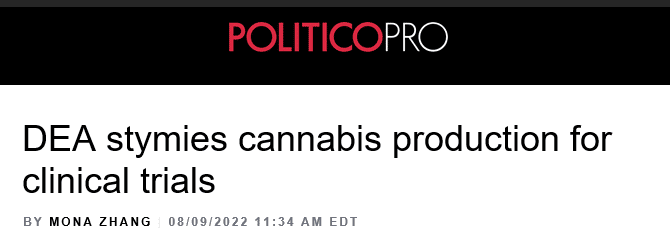Tennessee member NuSachi, Inc. did everything right, but the DEA is blowing off its own deadlines—and Congressional mandates—to prevent research into cannabis

A new story in Politico Pro (paywalled) details how Tennessee member NuSachi submitted an application to produce marijuana for clinical trials all the way back in June of 2021, following the DEA’s own guidance and supplying every data point the marijuana research application process demanded, only to be met with… silence:
NuSachi has submitted three applications to produce research marijuana, but says the agency is failing to comply with its own regulations and statutory deadlines for processing two of its applications to produce Schedule I substances for clinical trials.
While the Biden administration hasn’t acted on calls to loosen federal marijuana restrictions, citing a lack of research, “at the same time, its DEA is blocking clinical trials,” said Shane Pennington, an attorney for NuSachi.
Good faith attempts to satisfy the demands of the DEA’s own application process have yielded no results for NuSachi, which is in a resource-draining holding pattern until DEA decides it wants to respond. Attempts to seek clarification, or even an update, are met with Kafka-esque bureaucracy and circular logic:
The DEA did not respond to specific questions about NuSachi’s applications, but a spokesperson for the agency pointed to guidance, rulemaking and regulations surrounding manufacturing controlled substances for research purposes. Those documents seem to support NuSachi’s assertions that the agency is not complying with its own rules and regulations.

Following the lack of response from the nation’s top drug cops, NuSachi availed itself of a second application option that includes a deadline for the DEA to respond set by Congress. Yet no word has come from with the law enforcement agency tasked with overseeing marijuana grown for research purposes.
In a letter sent to DEA Administrator Anne Milgram last month, Pennington outlines NuSachi’s attempts to comply with all legal requirements under the 2015 law. “DEA has arbitrarily and without statutory authority added additional requirements never mentioned in the statute, any agency regulation, or even any agency [guidance] document,” the letter reads.
The runaround from the DEA is unsurprising because one of the main obstacles to removing marijuana from the Controlled Substances Act is a lack of research proving that it is a safe and effective treatment for specific ailments. So, by not responding in a timely fashion to applications to produce marijuana for clinical trials, the DEA is safeguarding its own authority. It’s a stark demonstration of the difference between federal regulatory agencies like the FDA and the USDA and law enforcement agencies like the DEA. Within regulatory agencies, the bureaucracy slows and complicates everything, but the process grinds inexorably forward. The DEA, as a law enforcement agency, is much more comfortable creating roadblocks to progress using plainly illogical reasoning:
For example, the agency told NuSachi representatives that it can’t consider its application because the research plan for the clinical trial that NuSachi would be producing marijuana for does not list NuSachi as the manufacturer.
That requirement “appears nowhere in the statute, and no DEA regulation, guidance document, or [administrative] decision supports it,” the letter says.
Essentially, the DEA is telling NuSachi that it must be named as the supplier of research marijuana for a clinical trial in the plan submitted to federal agencies in order to have its application to manufacture marijuana move forward. But NuSachi cannot be named as the supplier without first securing the DEA license for which it is applying.
NuSachi is in a catch-22 that appears to be deliberate on the part of the Drug Enforcement Administration. A legislative fix, like the Medical Marijuana and Cannabidiol Research Expansion Act, is not very likely to help. After all, DEA is already blowing off deadlines mandated by Congress, so passing more mandates isn’t likely to move the needle.
Unfortunately, the irrational designation of the cannabis plant as a Schedule 1 drug (a designation shared by bath salts and heroin, among others) will continue to generate imperfect policies that create impediments to research and progress. DEA is a law enforcement agency but is tasked with regulating an agricultural commodity, which is something that lies far outside of the DEA’s expertise and the comfort level of the vast majority of its employees (illustrated by their extensive history of attacking hemp). So long as this dysfunctional dynamic remains in place, companies working in the cannabis space will continue to face unnecessary challenges and a begrudging regulatory environment.
*Disclaimer: ”marijuana” is the Federal government’s name for varietals of the cannabis plant with Delta 9 THC levels of greater than 0.3%—i.e. cannabis that isn’t hemp. The word and its usage have a racist history, and it is only used here by necessity.

